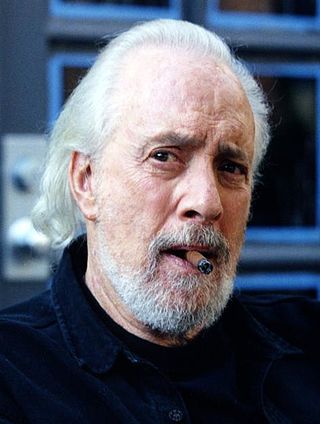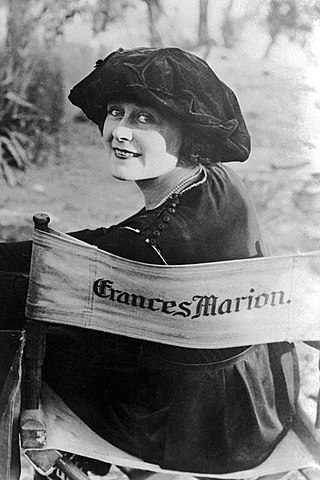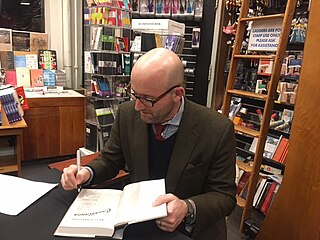Related Research Articles

Robert Towne was an American screenwriter and director. He started writing films for Roger Corman, including The Tomb of Ligeia in 1964, and was later part of the New Hollywood wave of filmmaking.

Detour is a 1945 American independent film noir directed by Edgar G. Ulmer starring Tom Neal and Ann Savage. The screenplay was adapted by Martin Goldsmith and Martin Mooney (uncredited) from Goldsmith's 1939 novel of the same title, and released by the Producers Releasing Corporation, one of the so-called Poverty Row film studios in mid-20th-century Hollywood. The film, which today is in the public domain and freely available for viewing at various online sources, was restored by the Academy Film Archive in 2018. In April that year, the 4K restoration premiered in Los Angeles at the TCM Festival. A Blu-Ray and DVD was released in March 2019 from the Criterion Collection. In 1992, Detour was selected for the United States National Film Registry by the Library of Congress as being "culturally, historically, or aesthetically significant".

Richard Horatio Edgar Wallace was a British writer of sensational detective, gangster, adventure, and sci-fi novels, plays and stories.

Frank Borzage was an American film director and actor. He was the first person to win the Academy Award for Best Director for his film 7th Heaven (1927) at the 1st Academy Awards.
Karyn Kiyoko Kusama is an American filmmaker. She made her feature directorial debut with the sports drama film Girlfight (2000), for which she won Best Director and the Grand Jury Prize at the Sundance Film Festival and was nominated for the Independent Spirit Award for Best First Feature.

Frances Goodrich was an American actress, dramatist, and screenwriter, best known for her collaborations with her partner and husband Albert Hackett. She received the Pulitzer Prize for Drama with her husband in 1956 for The Diary of Anne Frank which had premiered the previous year.

Edgar Georg Ulmer was a Jewish-Moravian, Austrian-American film director who mainly worked on Hollywood B movies and other low-budget productions, eventually earning the epithet 'The King of PRC', due to his extremely prolific output for the Poverty Row studios. His stylish and eccentric works came to be appreciated by auteur theory-espousing film critics in the years following his retirement. Ulmer's most famous productions include the horror film The Black Cat (1934) and the film noir Detour (1945).

Frances Marion was an American screenwriter, director, journalist and author often cited as one of the most renowned female screenwriters of the 20th century alongside June Mathis and Anita Loos. During the course of her career, she wrote over 325 scripts. She was the first writer to win two Academy Awards. Marion began her film career working for filmmaker Lois Weber. She wrote numerous silent film scenarios for actress Mary Pickford, before transitioning to writing sound films.

Dorothy Kingsley was an American screenwriter, who worked extensively in film, radio, and television.

Keeper of the Flame is a 1942 American drama film directed by George Cukor, and starring Spencer Tracy and Katharine Hepburn, released by Metro-Goldwyn-Mayer (MGM). The screenplay by Donald Ogden Stewart is adapted from the 1942 novel Keeper of the Flame by I. A. R. Wylie. Hepburn plays the widow of a famous civic leader who has died in an accident. Tracy portrays a former war correspondent who intends to write a flattering biography of the dead man, only to find that his death is shrouded in mystery. Screenwriter Stewart considered the script the finest moment of his career, feeling vindicated by the assignment as he believed that Hollywood had punished him for years for his political views. Principal filming began in the last week of August 1942, four months after the release of the novel, published by Random House. The picture was filmed on a sound stage, with no location shooting. Hepburn had already begun a relationship with Tracy, and his heavy drinking led her to become his vigilant guardian during the filming.
Amy Holden Jones is an American screenwriter and film director best known for directing The Slumber Party Massacre and for creating the FOX medical drama The Resident. She has edited various films and later began directing and writing. She currently works in television.
Bart Lytton ( was an American business executive, Democratic Party fundraiser, writer, public relations executive and philanthropist. He was a founder of Lytton Financial Corporation, one of the five largest savings and loans in the United States with $700 million in assets.

Beyond the Time Barrier is a 1960 American science fiction film. It was released in September 1960 on a double bill with The Angry Red Planet. It starred Robert Clarke and directed by Edgar G. Ulmer. Ulmer's wife Shirley acted as a script editor while their daughter Arianne Arden appeared as a Russian pilot. It was one of two low budget sci-fi films shot back-to-back in Dallas, Texas by Ulmer. The combined filming schedule for both films was only two weeks.

Isle of Forgotten Sins is an American South Seas adventure film released on August 15, 1943 by PRC, with Leon Fromkess in charge of production, directed by Edgar G. Ulmer and featuring top-billed John Carradine and Gale Sondergaard, whose performance in one of 1936's Academy Award for Best Picture nominees, Anthony Adverse, earned her the first Academy Award for Best Supporting Actress.
Leo Erdody was an American film composer. He studied music in Germany, and later went to Hollywood, scoring his first film in 1921. He later joined Producers Releasing Corporation and scored several films for them. For his work on Minstrel Man, he was a nominee for an Academy Award for Best Original Score.

The Cavern is a 1964 Italian-German-American war-drama film directed by Edgar G. Ulmer. This was his last film as a director. It was one of a number of war movies John Saxon made outside Hollywood.

Thunder Over Texas is a 1934 American populist contemporary Western film directed by Edgar G. Ulmer under the alias Joen Warner and produced by two nephews of Universal Pictures head Carl Laemmle, Arthur and Max Alexander's Poverty Row Beacon Productions. The film's story was written by Shirley Ulmer under the name of Sherle Castle. Shirley was then married to Max Alexander but would soon leave Max to marry Edgar with the result that Lammele blacklisted Ulmer from Hollywood. The film was shot in Kernville, California.
American Matchmaker, or אמעריקאנער שדכן is a 1940 Yiddish-language American comedy film directed by Edgar G. Ulmer and starring Leo Fuchs, Judith Abarbanel, Judel Dubinsky and Anna Guskin. The film's music was composed by Sam Morgenstern and its screenplay was written by Shirley Kassler Ulmer under the name Shirle Castle.

Noah William Isenberg is an American film scholar and historian. Isenberg is currently the Charles Sapp Centennial Professor and former Chair of the Department of Radio-Television-Film at The University of Texas at Austin. He previously served as Professor of Culture and Media at Eugene Lang College, where he was also the founding director of the Screen Studies program. Isenberg received his BA in History from the University of Pennsylvania, his MA in German Literature from the University of Washington and his PhD in German Studies from the University of California at Berkeley.
Krysty Norma Lesley Wilson-Cairns is a Scottish screenwriter. Born and raised in Glasgow, she studied at the Royal Conservatoire of Scotland and the National Film and Television School. During her teenage years, she was a runner on television series including the detective show Taggart. Her script for the unproduced science fiction thriller Aether made the 2014 Black List and led to a staff writer role on the television show Penny Dreadful. Her feature film debut was the screenplay for the Sam Mendes-directed 2019 war film 1917. She co-wrote it with Mendes and received nominations for the Academy Award for Best Original Screenplay and the Writers Guild of America Award for Best Original Screenplay.
References
- 1 2 3 4 5 6 7 8 9 10 11 12 13 14 15 16 17 18 19 Bergan, Ronald (2000-09-04). "Shirley Ulmer". The Guardian. ISSN 0261-3077 . Retrieved 2023-12-03.
- 1 2 3 4 Archives, L. A. Times (2000-08-14). "Shirley Kassler Ulmer; Screenwriter of 'American Matchmaker'". Los Angeles Times. Retrieved 2023-12-04.
- 1 2 3 4 5 6 Weaver, Tom (2010-06-21). I Was a Monster Movie Maker: Conversations with 22 SF and Horror Filmmakers. McFarland. pp. 227–236. ISBN 978-0-7864-6265-0.
- ↑ Isenberg, Noah William (2014-01-09). Edgar G. Ulmer: A Filmmaker at the Margins. Univ of California Press. p. 76. ISBN 978-0-520-23577-9.
- 1 2 3 "SHIRLEY ULMER". catalog.afi.com. Retrieved 2023-12-04.
- 1 2 3 4 Wolf, Jonathan (2000-08-16). "Shirley Kassler Ulmer". Variety. Retrieved 2023-12-04.
- ↑ Ulmer, Shirley; Sevilla, Carol R. (1986). The Role of Script Supervision in Film and Television: A Career Guide. Hastings House. ISBN 978-0-8038-6366-8.